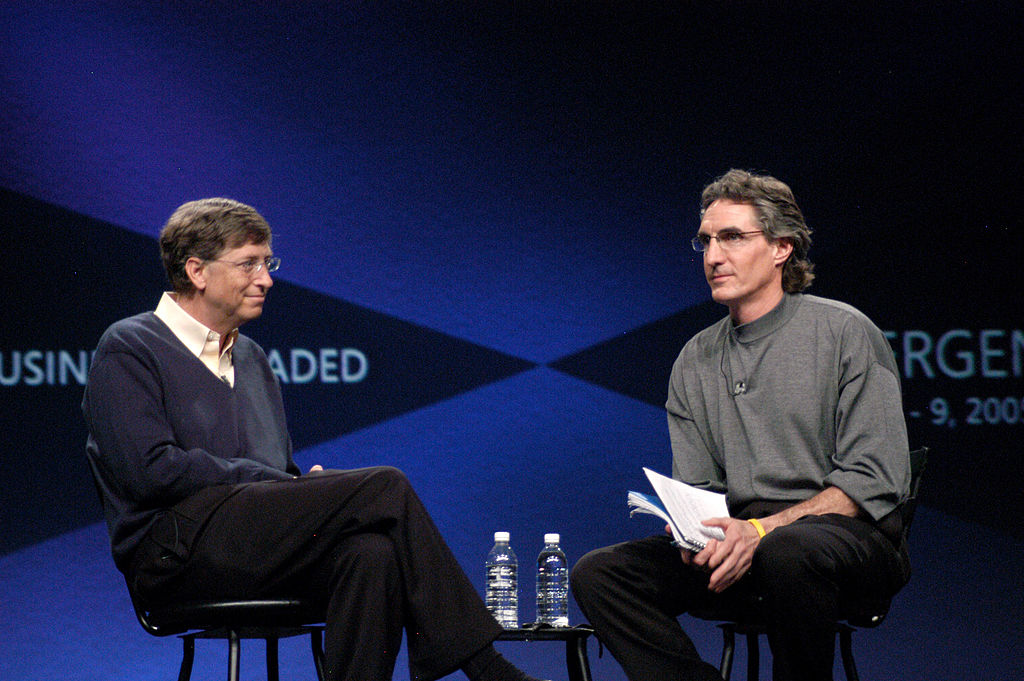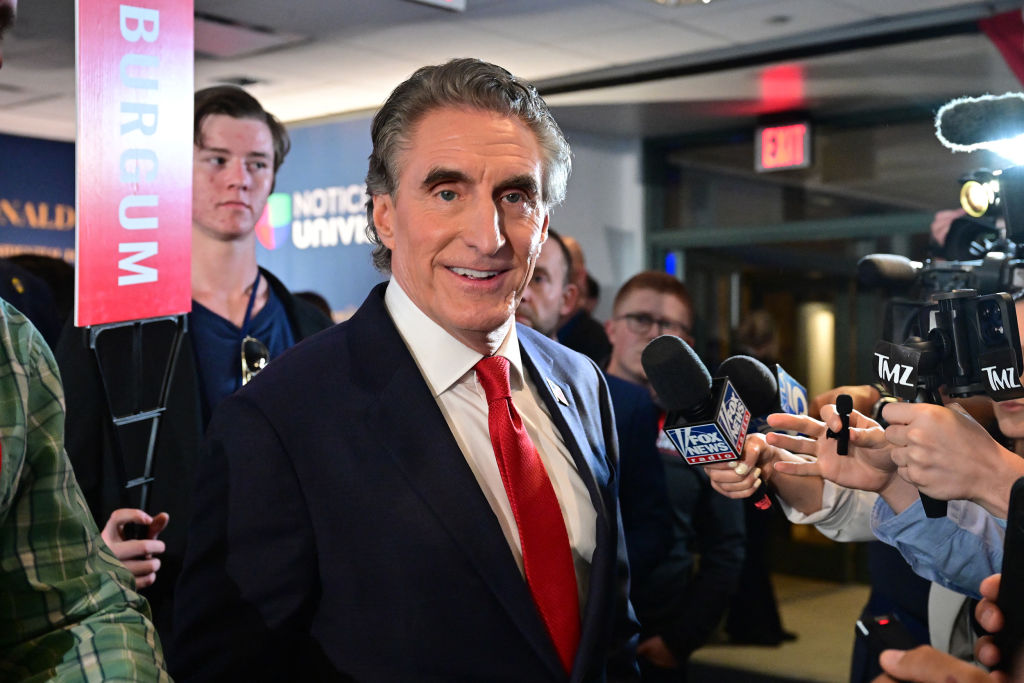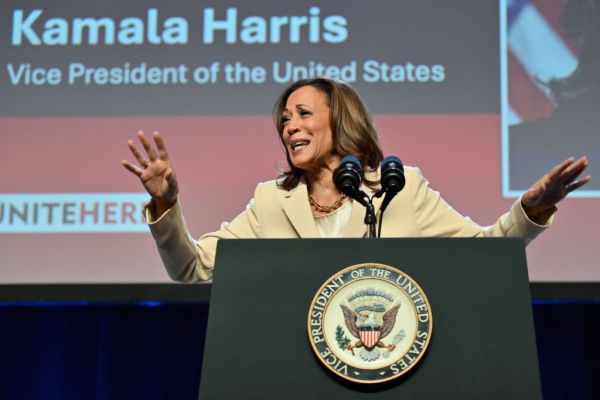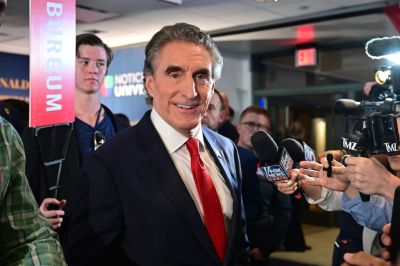ATLANTA—Five times Doug Burgum was asked to discuss the possibility of joining the Republican ticket as Donald Trump’s running mate. Five times the North Dakota governor dodged.
It was late in a June evening after Trump had just walloped President Joe Biden in a televised debate before 50-plus million viewers in primetime, cementing his position as the favorite to win the White House this fall. Burgum was inside a basketball arena turned spin room on the campus of Georgia Tech. The governor, like other Trump surrogates, was there to declare the former president the undisputed winner of the debate.
But with the outcome of the first (and perhaps only) Biden-Trump faceoff of 2024 so lopsided, reporters’ attention shifted to Burgum’s immediate future as the GOP’s possible nominee for vice president.
“Have you been asked to serve?” the governor was asked. “Well, tonight’s all about President Trump and his big victory,” he answered with a wide grin on his face and a gleam in his eye. That doesn’t sound like a “yes” or a “no,” a reporter countered. “We just have to stay focused tonight because President Trump is so strong,” Burgum said, refusing the bait. “President Trump, right now, has got the ability to probably win this election, just by himself, even without a VP.”
Burgum wasn’t the only official auditioning to be Trump’s running mate to brag about the former president’s debate performance in Atlanta. Sens. Marco Rubio of Florida and J.D. Vance of Ohio were mobbed in the spin room by a political press corps anxious for fresh information about Trump’s forthcoming decision. That decision is expected imminently—no later than July 15, opening day of the GOP nominating convention in Milwaukee.
The Dispatch caught up with North Dakota’s chief executive in the debate spin room and asked about his past opposition to Trump—as made plain by his own campaign for the Republican nomination—and his past opposition to serving as Trump’s vice president. Burgum was dismissive, claiming to have always been a Trump supporter and waxing poetic about the 45th president’s superiority in all things.
“I was running against Joe Biden when I was running for president and I never—I was always focused on the fact that Joe Biden was taking this country in the wrong direction on energy, on national security, and on the economy,” he said. “If you had the sound off tonight, you knew who was in charge, who was strong and who was weak.”
It’s true—Burgum did not express much public criticism of Trump during a White House bid that lasted less than six months.
But in May 2023, before becoming a presidential candidate, Burgum told Joel Heitkamp, a liberal talk radio host in Fargo, North Dakota, that “if this is a Trump versus Biden, that’s a bad thing—a bad choice—for both parties and I think the nation would be well served if Americans had an opportunity to vote for some alternatives in 2024.” In October, during a subsequent wide-ranging Dispatch Podcast interview, the governor rejected Trump’s unfounded claim that the 2020 election was stolen. “He lost,” Burgum said, without hesitation.
Burgum, 67, was little known outside of North Dakota before he mounted his underdog bid for the Republican presidential nomination in June 2023.
Politics aside, Burgum’s possible rise to the second highest office in the land is a quintessentially American tale. Married to his second wife, Kathryn, and the father of three adult children from his first marriage, Burgum hails from tiny Arthur, North Dakota, population 325. The small-town farm boy became a billionaire software mogul and respected philanthropist before going on to become a popular two-term governor.
His presidential campaign went nowhere and he dropped out in December. But Burgum has since formed a close relationship with Trump, and his name is among the most often mentioned on the presumptive Republican nominee’s VP shortlist.
Burgum’s Democratic detractors at home say the governor’s actions over the past year-plus amount to nothing more than a cynical ploy for just this sort of political advancement and power. Indeed, Burgum was so revered for building his successful computer software company in North Dakota and his politics were so opaque that when he decided to run for governor in 2016, some Democrats envisioned him as a gubernatorial contender they might support.
“I met with him a couple of times and urged him to run for governor as an independent,” Heitkamp, a Democratic former state legislator, told The Dispatch. “I thought, this is a guy who, if we do this right, could bring this state around.” (Heitkamp’s sister is former Democratic North Dakota Sen. Heidi Heitkamp.)
That evolution is evident in the types of policies Burgum has backed as governor, his critics say. Last year, the governor signed a bill prohibiting biological males from participating in female sports in grades K-12 and college, a signature he granted after vetoing a similar measure two years earlier. Burgum also signed into law legislation mandating a near-total abortion ban, with exceptions for rape and incest only during the first six weeks of pregnancy. Exemptions for medical emergencies are permitted throughout pregnancy.
Those positions mark the change Democrats say they’ve seen in Burgum.
“The consensus of North Dakota Democrats was, Burgum was a moderate, decent guy and someone we could work with,” state Democratic Party Chairman Adam Goldwyn said. “We saw a real evolution of Doug Burgum when he decided he wanted to be president.”
The assumption was that Burgum, a businessman who had never run for office, could not succeed in a Republican primary dominated by political veterans with demonstrated conservative records. If Burgum won, some thought, he might govern as a centrist Republican willing to compromise with Democrats. But 2016 turned out to be a good year for political outsiders who had spent their careers in the boardroom to upend established Republicans in primaries, especially if they had a personal fortune to finance their campaigns.
After getting crushed by well-liked North Dakota Attorney General Wayne Stenehjem in the race for the state GOP’s gubernatorial endorsement (as voted on by party delegates), Burgum cruised to victory over Stenehjem in a subsequent statewide Republican primary. In ruby red North Dakota, that nomination translated into an easy general election win the same night Trump was crowned president-elect and, unlike Trump, an easy reelection four years later. Like many new politicians steeped in the private sector, Burgum’s transition to elected official was rocky.
The North Dakota Legislature, although overwhelmingly Republican, was skeptical of Burgum. The new governor, for his part, was frustrated with an occasionally cumbersome lawmaking process and resistance to his spending and policy agendas from some legislative Republicans. He even tried his hand at ousting some of these legislators in GOP primaries in the 2018 midterm elections, to mixed results.
“When he first started off, he did ruffle a lot of feathers with the legislature and the political establishment here,” a Republican who serves in the North Dakota Legislature said, requesting anonymity to speak candidly. “And there was definitely some frustration, not necessarily with people, but with how the political process works. You have this legislature which is effectively a huge board of directors.”
“He quickly realized you can’t go it alone because the legislature needs to pass almost everything you want to do,” this GOP legislator added. “Doug realized you have to build relationships and deal with people.” Burgum ultimately figured out his new gig, made believers out of Republican legislators (mostly,) and became a productive policymaker.
Burgum enacted a $515 million tax-cut package that meant a majority of North Dakotans no longer pay income taxes. He has pushed an aggressive public education reform agenda, signed public safety legislation, reduced government regulations, and expanded gun rights. Because of fracking, North Dakota is a major energy producing state, and Burgum supports robust fossil fuel exploration, in-state across the country. But he also signed legislation that invests $25 million to support the development of low-emission, clean energy technologies.
But no review of Burgum’s second career as a politician would be complete without understanding the extraordinary success he achieved with Great Plains Software.

Burgum obtained an undergraduate degree from North Dakota State University and a Master of Business Administration from Stanford University. In 1983, at age 26, he joined Great Plains Software as vice president of marketing, mortgaging a substantial amount of family farmland to raise cash to purchase a piece of the software company and becoming its first outside investor. In March of the following year, he purchased Great Plains outright with a group of investors, becoming the firm’s president.
Great Plains went public in 1997 and then, in 2001, Burgum sold the firm to Microsoft for $1.1 billion (Burgum found yet more financial success on the boards of other corporations). But during his 17 years running Great Plains, Burgum made a crucial decision that would pave a path to the governor’s mansion.
Rather than move his firm to computer industry hubs like Seattle or Silicon Valley, Burgum chose to grow his company in North Dakota. He was so committed to doing so that Burgum made Microsoft’s acquisition of Great Plains contingent on the software giant maintaining an extensive campus and keeping key personnel in Fargo. That show of faith in North Dakota, a sparsely populated state that often bleeds talent, made Burgum a beloved figure.
“We’re used to being overlooked, and used to our most favorite people making their wealth and fame somewhere else,” said Rob Port, a political columnist for the Forum newspaper in Fargo. “He did it here, and that really matters.”
Republicans who worked on Burgum’s gubernatorial campaigns and for his administration in Bismarck described him as “wonky curious,” encouraging, generous, a “natural leader,” a hard-worker and hyper-focused on policy and solving problems. These are attributes Burgum honed and displayed during his years running Great Plains Software, say people who worked for him there.
Tami Reller started working for Burgum in 1984, at age 19, to help cover college tuition. She was employee No. 36 at Great Plains Software, beginning as a receptionist before quickly transitioning to accounting intern. After she announced she was resigning to return to school and earn a master’s degree, Burgum told her he was impressed by Reller’s knowledge of the company’s accounting software and offered her a promotion, saying she could choose whichever U.S. market she wanted to live in.
By the time of Microsoft’s acquisition in 2001, Reller was its chief financial officer. She credits the governor for her career arc, describing him as a unique and powerful leader. Burgum, Reller said, used to drop off his kids at school every day not with the typical “Have a great day,” but by telling them, “Ask great questions.” That might sound insignificant, she said, but it was indicative of how he approached running Great Plains Software—always questioning, always improving, always innovating.
But to Reller, the most revealing example of Burgum’s leadership style involved his response to a botched software launch.
He was obsessed with product quality control and customer service, according to Reller. Great Plains would use an annual company conference, “Stampede to Fargo,” to promote new software and entertain the sales representatives and wholesalers who were pitching the firm’s products in various U.S. and foreign markets. After Great Plains’ launch of a product filled with bugs and other quality issues, Burgum attacked the problem head on and took full responsibility.
During an open-mic question-and-answer session in a hotel ballroom, Burgum “took a raw egg and slammed it on his head,” Reller said, “and proceeded to let it drip down his hair and face and said, ‘I, and we, have egg on our face.’”
“His power comes from being able to articulate a strategy, know the details and gather enough perspective to come collectively with the right decision—and in a pretty quick manner. He definitely has a healthy level of impatience and he cares deeply about quality,” she added. He also has a “tremendous amount of humility. That does make him much more effective, approachable, able to get the best ideas out of others as well.”
Businessmen who reach the heights Burgum has reached, and politicians ambitious and egotistical enough to seek the presidency, are not necessarily the most humble of creatures. But it’s not hard to see how the North Dakota governor’s understated demeanor might make Trump comfortable with a partnership, and possibly put him one heartbeat away from the presidency. Burgum’s personal fortune—he loaned his own presidential campaign $14.8 million—and his willingness to spend it on politics also might be attractive to Trump. The governor certainly appears to understand Trump well enough to leave this decision squarely in his court.
Back in Atlanta, after the debate, reporters tried repeatedly to squeeze information out of potential Trump running mates, including Burgum, Rubio and Vance, about the vetting process, or what Trump values in a vice presidential nominee—anything to shed light on what the former president is likely to do. Some conceded it would be an honor they couldn’t pass up, and were willing to discuss the difference they believed they might make for the country as the former and possibly future president’s deputy.
Burgum wouldn’t bite: “President Trump gets to make that choice on who he wants as his governing partner whenever works best for him, and he’s the only one that knows who that choice is going to be—and he’s the only one that knows the timing.”







Please note that we at The Dispatch hold ourselves, our work, and our commenters to a higher standard than other places on the internet. We welcome comments that foster genuine debate or discussion—including comments critical of us or our work—but responses that include ad hominem attacks on fellow Dispatch members or are intended to stoke fear and anger may be moderated.
With your membership, you only have the ability to comment on The Morning Dispatch articles. Consider upgrading to join the conversation everywhere.